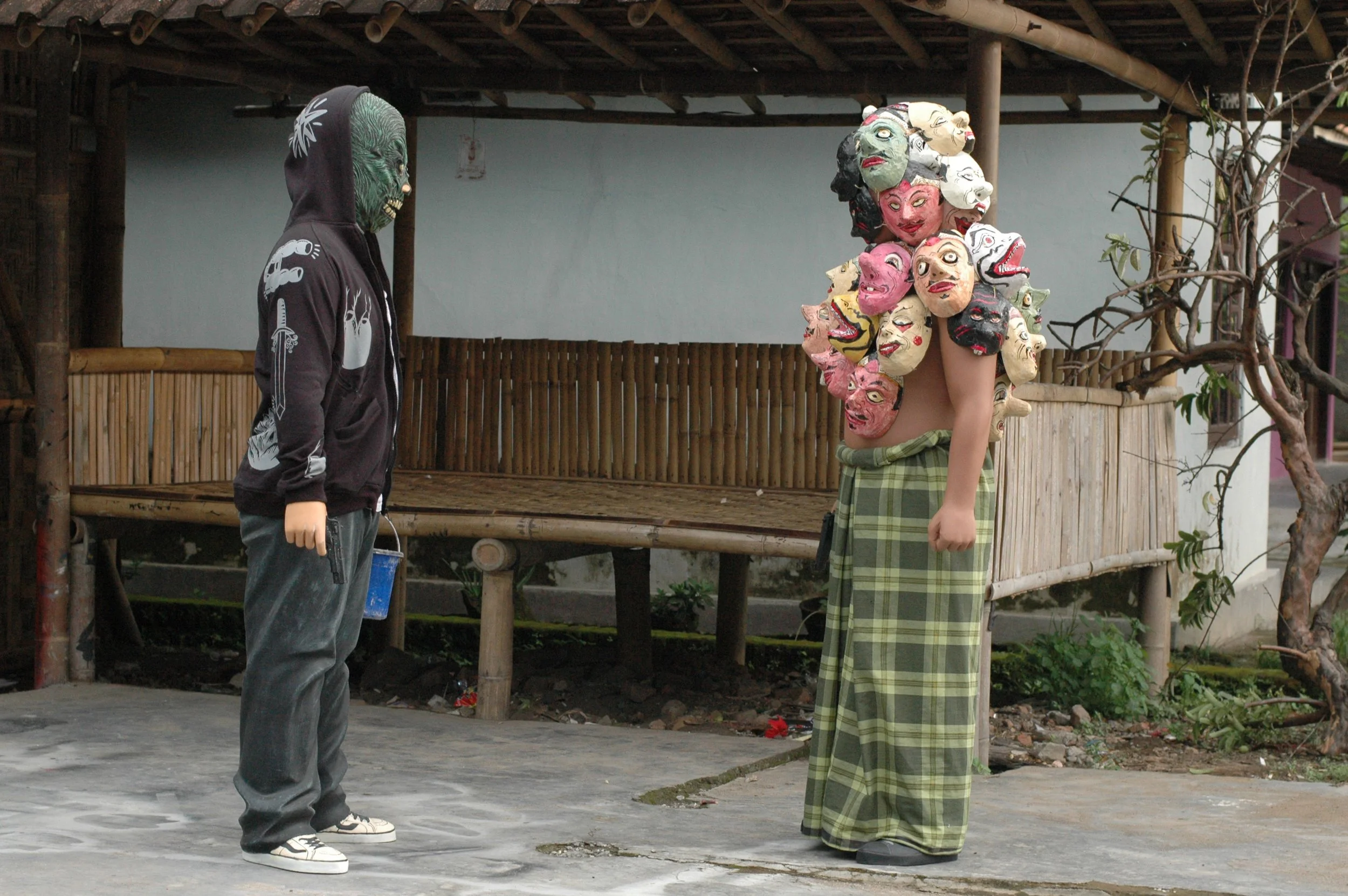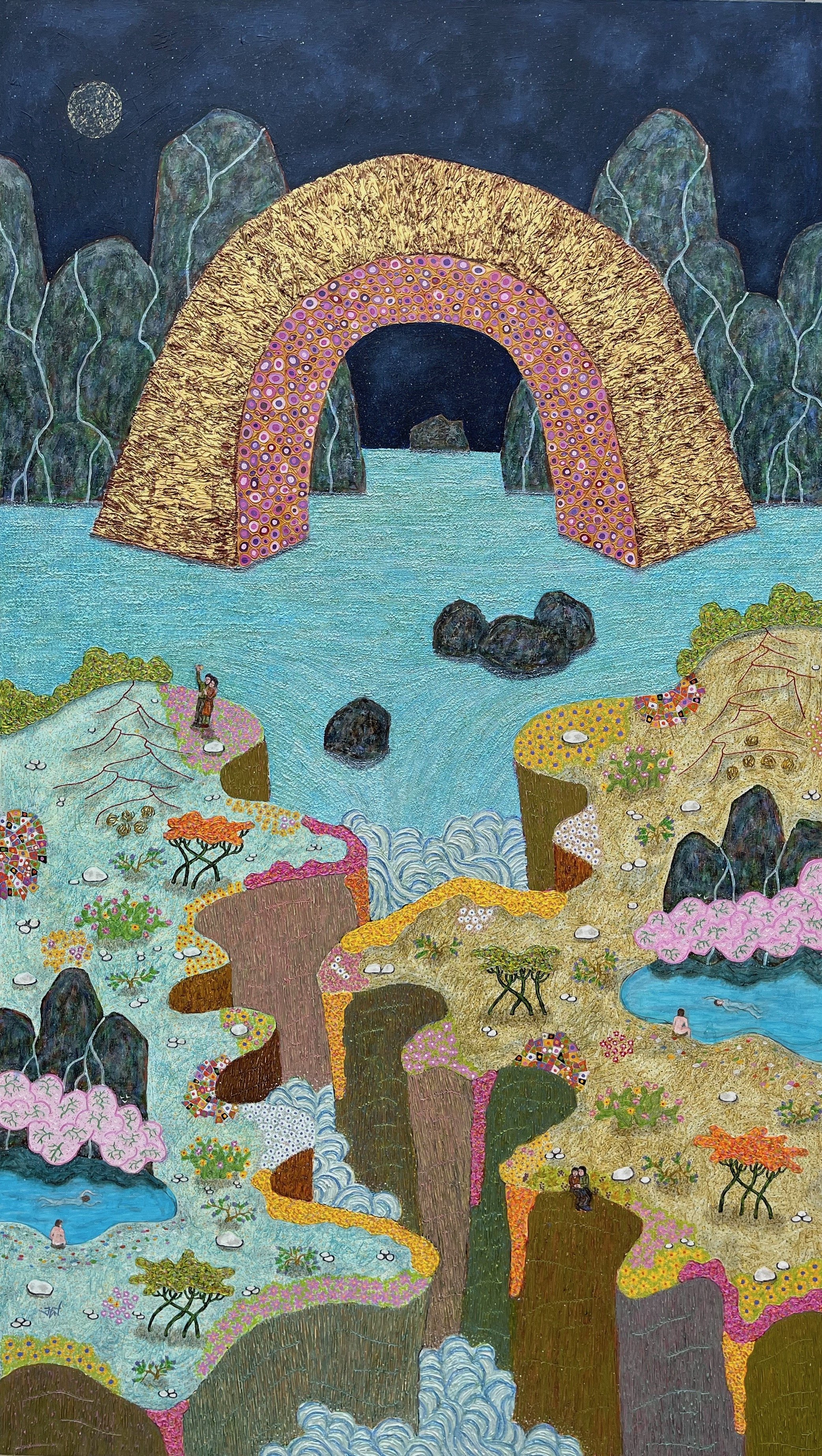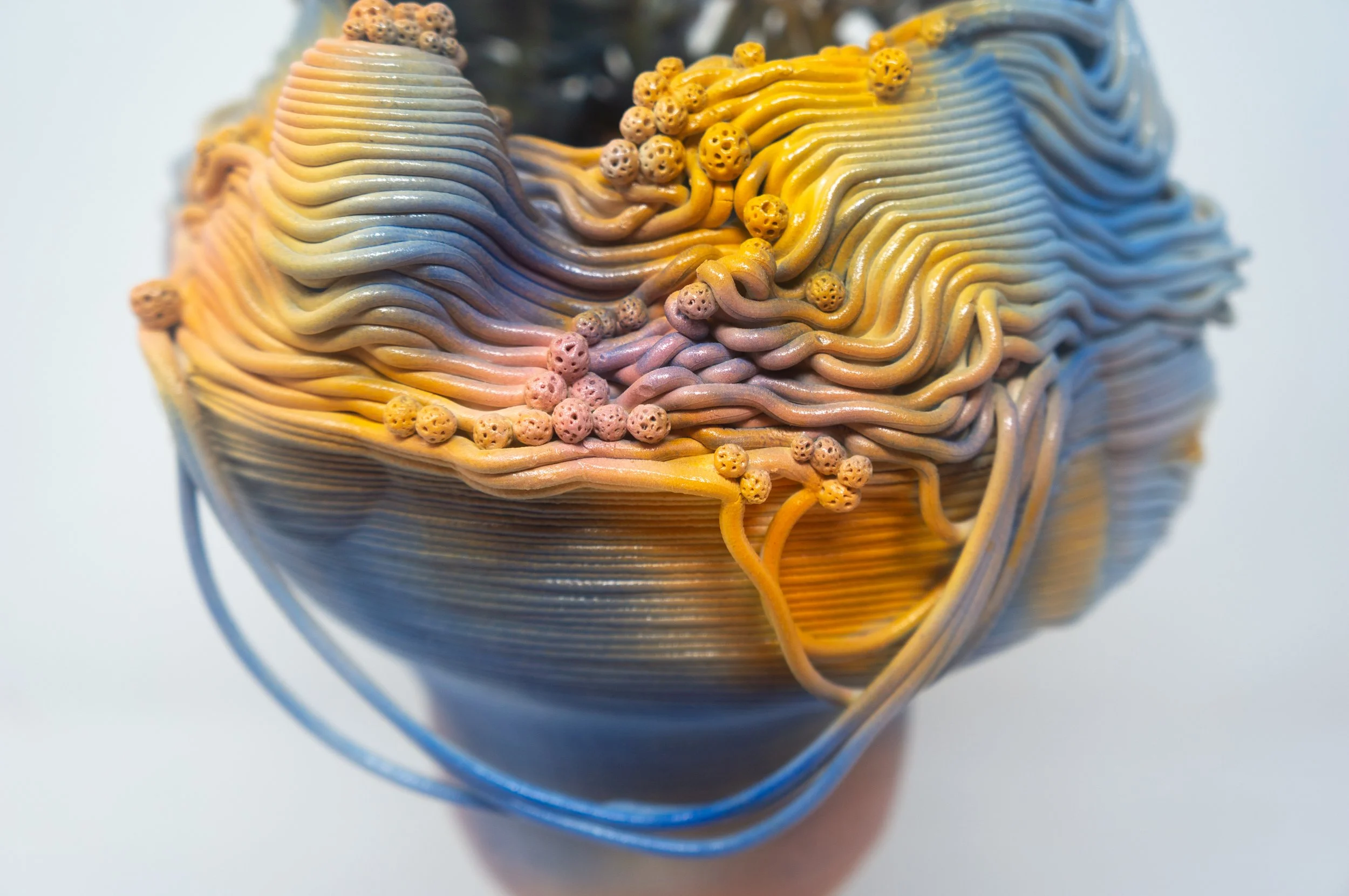Excerpt from 24 HOURS WITH GASPAR (Seagull Books, May 2023)
By Sabda Armandio
Translated from the Indonesian by Lara Norgaard
Eko Nugroho - The Dance Corps series "Creamy Crisis" (2016), Fiberglass painted with acrylic, manual embroidery, buffalo skin, whip, books, plastic chain, helmet, aluminium, 186 cm x 62 cm x 31 cm, Photo by Oki Permatasari, Courtesy of Studio Eko Nugroho
Image description: A life-sized, naturalistic sculpture of a dark-skinned human figure stands poised on a hardwood floor against a white wall. He is facing slightly left, with his bare feet shoulder-width apart and his arms lowered by his sides. His wrinkled face wears a stern expression. He is dressed in a black shirt with the words "CREAMY CRISIS" printed in white and a red sarong with white prints of birds and diamonds. He also wears a red, knotted sash around his waist, with its long ends hanging down and decorated with white and purple batik prints. On his head is a large, elaborate headwear. The front of this headwear is a flat, golden cutout of a bird of prey that partially covers the figure's forehead. The same bird image is a motif on his sarong. The headwear also consists of a long, yellow scarf with golden, beaded tassels on both ends, draping over the figure's head and reaching his wrists, framing his head and upper body with the yellow cloth. The bird cutout and the yellow scarf are held up by a metal frame, which is attached to a black helmet worn by the figure. In his right hand, the figure holds thick metal chains wrapped around two white books. In his left hand, he holds a long whip made of rope. The end of the whip rests on the floor in front of him.
I’m going to rob the jewellery store with help from my motorbike, Cortázar. T minus 24 hours.
I eased off the fuel and Cortázar coasted to a stop by the warung near the store in question. I bought a bottle of iced green tea, a pack of cigarettes and two bars of soap at 12 on the dot. I dumped the tea and pulled out a flask of absinthe from my backpack. After filling up the now empty bottle, I tossed the flask into the warung’s dustbin and tucked the bars of soap into my bag for safekeeping. My goal: observe the jewellery store without arousing suspicion. I spotted an ATM security guard sitting out front; each shift was 12 hours long. Inside the store were two employees, a husband and wife. The owner was a man of Yemeni descent who’d turned 57 a couple of weeks earlier. I knew that because his birthday coincided with my first visit to the shop. He’d given me a piece of brownie and a date the size of my thumb. People call him Wan Ali.
I’d gone into the store to help a friend of mine pick out an engagement ring, but my plans changed when Wan Ali showed me a black box the size of a cell phone. In a thick accent, he said, ‘If you were the owner of this box, forget about asking for your in-laws’ blessing—each of them would jump at the chance of marrying you.’
I recognized the box immediately.
‘What about that one?’ I pointed to a dull, violet-toned box painted with little flowers. It had been placed on a shelf alongside a few souvenirs from Mecca; in a photo above the box a teenage girl smiled sweetly. I’d redirected Wan Ali’s focus so that he wouldn’t think I’d taken an interest in the box he was holding.
‘Oh, that was my late daughter’s. There’s nothing special about it.’
Wan Ali turned his attention to a broken electric fan that made a snapping sound every few seconds and leaked an oily liquid from its base. He apologized, wiping away grease with one hand while trying to secure the head of the fan with the other. The appliance stayed stable for barely a second. Realizing that it was a lost cause, he gave up and locked the black box in the display case and then took out a ring and started telling me about the gemstone.
The gemstone came from Planet Penus (he meant Venus). A chunk of red rock careened towards Earth and hit the Indian Ocean. Plummeting in temperature, a nearly transparent blue glaze appeared on the surface of the stone, leaving a berry-red dot the size of a pinhead at its core. If its owner is sinful, Wan Ali said, the ring will turn dark grey. While telling the story, he said the word Penus ring almost as often as the fan made its wounded squeal. I wondered, had he ever accidentally said the word penis to customers while bragging about the bauble he held in his hand?
I pestered him about the violet-toned box on the shelf. Again, he refused to show it to me, claiming it held nothing of value.
‘Then show me what’s inside the black box instead.’
He chuckled and chided me: it’s forbidden to reveal secrets on a Friday. Changing the topic, he asked me why I had a dragon embroidered on my jacket. I was too dark-skinned to be Chinese, he said. I tersely replied, I’m not Chinese, but back in university I was in a lion-dance troupe. He believed me.
Eko Nugroho - Membaca Bangsa dalam Diri (Reading the Nation Inside You) (2015), Fiberglass painted with acrylic, cloth painted with acrylic, 190 cm x 105 cm x 57 cm, Photo by Regina Sari Dewi, Courtesy of Studio Eko Nugroho
Image description: A life-sized sculpture of a human figure stands on a hardwood floor against a white wall. The figure faces forward and stands with feet shoulder-width apart. A large, elaborate, patchwork cloth in the shape of a sack covers the entire body, concealing everything except the figure's black pant cuffs, brown sneakers, and right hand, which grips a pistol. The figure's face is partially visible under a small piece of black mesh; their expression is impartial. The patchwork covering is intricately decorated with a vibrant assemblage of colorful patterns and materials. Long, yellow bolster pillows are wrapped around the upper right corner; semicircle patterns adorn the area surrounding the figure’s face, extending downwards on the right. Where the figure’s upper body should be are abstract, orange shapes, layered on red and white prints and shiny gold material. A pair of disembodied, black eyes is on the bottom left side of the patchwork, below which are spheres resembling eyeballs. Three thick, white-and-blue-striped bolster pillows extend from the top left corner of the pathwork, beneath which are colorful, flat, furry pieces of cloth. The figure’s gun-wielding hand extends down from a shiny, golden sleeve cuff.
I had a feeling that I’d seen the black box before, but a hunch wasn’t enough. I needed to see what lay inside. I tried to find out more about this Wan Ali fellow, and to learn how he’d got his hands on that box. I started visiting his jewellery store every day, subtly pumping his two employees for leads. Did I have anything better to do? Nah, I don’t have a day job.
I began by questioning Nurida. She worked with Yadi, her husband, who held an IT degree from a mediocre university. Yadi, as the store’s cashier, liked to greet customers with strange stories. His favourite conversation starter was, ‘Have you heard about . . .’
When I prodded them about Wan Ali’s personal life, Nurida and Yadi praised him effusively but failed to offer any concrete examples of their boss’s many virtues. This, along with a half dozen other giveaways, made me confident they were lying. Maybe my sources were the problem. Good dogs wouldn’t bite the hand that feeds them. Maimunah, Wan Ali’s wife, on the other hand, was a more credible informant. Of Sundanese and Javanese descent, she was born and raised in the Kampung Melayu neighbourhood of Jakarta. Right away, she began blabbing about Wan Ali’s depravity and didn’t so much as pause when her husband walked within earshot. ‘This sack of bones wants to get married again. Can you believe it? If he so much as tripped he’d be dead.’ Wan Ali glared, angry. Yadi and Nurida giggled.
When I swung by the store the next day, I overheard an argument between the jeweller and his wife. Wan Ali, holding a chessboard under his left arm, seemed serious. He shook his head violently in disagreement, mouth agape and eyes bulging out of their sockets; he wagged his right index finger in Maimunah’s face; he turned plum red, making his already unattractive features even uglier. I didn’t want to see anyone get slapped, so I drew attention to myself by mimicking the satisfying pop of bubble gum by tapping my tongue against the roof of my mouth. I like to click out melodies when I’m not working. Even though clicking generally produces monotone sounds, I can imagine the different pitches in my head. My click was particularly resonant. I may have achieved a new personal best for click volume. Wan Ali and Maimunah were shocked, like two thieves caught in the act. They stood there awkwardly until Wan Ali took the chessboard he’d been holding and said, ‘Ah, there you are. How about a game of chess?’ His body language, however, signalled he was not at all happy with my presence.
Eko Nugroho - Untitled (Petualang Berbahasa Hitam) (2015), Fiberglass painted with acrylic, batik bolster, 178 cm x 120 cm x 120 cm, Photo by Oki Permatasari, Courtesy of Studio Eko Nugroho
Image description: A sculpture of a human-like figure stands in a room with white walls and a gray floor. The figure's entire body is an elongated ovoid covered in black material, with two arms and two legs extending from it. The figure stands with its feet shoulder-width apart and wears black shoes. A knotted pile of long, batik bolsters sits atop the figure, dangling down and draping across the ovoid body. Large, sharp, claw-like structures protrude from the ovoid body. On the top left, middle, and bottom of the black surface material, three holes have been carved out; a pair of eyes look out from each hole, but the rest of their faces are completely obscured, making it impossible to discern the structure of the figure(s) underneath the black covering. The figure's right hand is raised, holding a string of flat beads, while the left hand is lowered, holding a book.
Despite my misanthropic tendencies, I can find ways to get a kick out of anyone. When it comes to chess, I’ll be the first to admit that I have no special talent for the game and rarely come up with a clever move. That said, as far as I know, the knight always moves in an L shape, whether it’s black or white or fucking turquoise. If there were an Abridged Edition of Common Knowledge, I’m pretty sure that rule would’ve been canonized in writing since mankind has come to a consensus on it. Maybe Wan Ali is the sole individual at odds with that consensus—or he’s the only human being on the face of the planet who doesn’t qualify as mankind, or quite the opposite, and he’s the lone entity who represents all humanity. Who knows. All I can say for sure is that he picked up his knight and moved it five squares, in the shape of the letter S. He acted with total confidence, stroking his thin beard and not so much as glancing in my direction to gauge my reaction.
I moved my knight the way you’re supposed to and captured his pawn as a rebuke: move your pieces like I do, like competitors do in any chess match I’ve ever seen, like every person who’s ever played chess. It pushed him over the edge. Angrily, he accused me of being a stooge of Western liberal ideology.
‘You know,’ he said, jabbing his finger at me, ‘infidels created an L-shaped move to sneak Liberal thought into the game. L clearly stands for Liberalism. It’s a cheap trick—don’t be so gullible.’
He corrected my knight’s move and took back his pawn, warning me not to fall for a wolf in sheep’s clothing. Me? I don’t look anything like a sheep. I tapped my tongue against the roof of my mouth and thought about how insignificant I am in this universe, about all the things I don’t know, and about how weird people can be. I came to the offhand conclusion that earth had been populated just to give me a few laughs.
From the moment I moved my knight until my opponent called checkmate, Wan Ali gabbed about his theory nonstop. I wanted to tell him that, in fact, the entire planet wholeheartedly believes in that conspiracy—each and every person, except for Wan Ali. That we’re not just believers, but active participants—everyone, except for the man across from me. But I chose to keep mum, I didn’t have the heart to hurt his feelings. I also refrained from teaching him the real rules of chess. I’m entertained by people who never grew out of naivety: innocent kids are adorable, and then as years pass, innocence starts to look a lot more like idiocy, which is no less amusing. I see no reason to correct stupid people; you might as well sit back and enjoy. Think of it as having a ticket to see lenong theatre or Rowan Atkinson playing Mr Bean.
The owner of the warung bugged me to take my change. Enough. I had 23 hours and 40-something minutes to wrangle together accomplices for a robbery. The plan was to steal the black box, but if they also felt like nabbing some gold or chopping up Wan Ali, so be it. My priority was taking a good look inside the box as soon as possible. I needed to come up with a plan, because if not, those 24 hours would pass me by. The simple thought of it raised my heartrate, not insignificantly.
Cortázar’s engine rumbled. I started scheming about how to entice a certain English teacher into joining the heist. She was also an old high-school friend of mine, a former sepak takraw player, and my ex. We were very close, to the point that there isn’t a thing I don’t already know about her. Not so much her about me. Mentioning her full name would be too unwieldy for readers who hastily draw conclusions, so for your sake, I’ll refer to her here as Kik. Earlier that day, I’d been reading a news article about the popularity of sepak takraw in Indonesia, and I couldn’t help but think back to Kik’s flexible body bending so she could whack the rattan ball with the inner curve of her foot. She was certainly skilled enough to battle Wan Ali.
I pulled the clutch towards me, switched gears and slowly released my grip while thinking about Kik.
Eko Nugroho - Ambiguous (2010), Resin, paper mask, bucket, sarong, Life-sized, Photo by Desi Suryanto, Courtesy of Studio Eko Nugroho
Image description: In an outdoor space with a large bamboo bench in the background and a bare tree on the right, two figures stand a few feet apart, facing each other. Both figures are poised and have their arms lowered by their sides. The figure on the left wears a black hoodie, dark pants, white sneakers, and a black-and-green mask that covers their entire face. In their right hand, they grip a pistol, while a blue bucket is partially visible on their left side. The figure on the right wears a green, plaid sarong. The top half of their body, including their head, shoulders, chest, torso, and back, is covered with traditional paper masks painted in white, beige, black, yellow, and pink. Their left fist is clenched.
Lara Norgaard is a literary critic and translator of Indonesian, Portuguese, and Spanish into English. Her essays and translations have appeared in publications including Asymptote Journal, Public Books, The Jakarta Post, and the Cuíer anthology of LGBTQ+ Brazilian literature (Two Lines Press, 2021). Her translation of the Indonesian novel 24 Hours with Gaspar by Sabda Armandio (Seagull Books) was awarded a 2021 PEN/Heim Translation Grant. Currently, she is a PhD student in comparative literature at Harvard University, where she researches solidarity and memory in post-dictatorship Latin American and Indonesian fiction.
*
Eko Nugroho is an internationally-renowned contemporary artist based in Yogyakarta, Indonesia. His body of work expands across a variety of media, from painting, installation, and sculpture, to drawings, embroidery, murals, and video works. His works are deeply anchored in both local traditions and urban environment, creating a new visual language where political messages are playfully intertwined with appropriated aesthetics of street art, graffiti, and comics.
If you’ve enjoyed reading this article, please consider making a donation. Your donation goes towards paying our contributors and a modest stipend to our editors. Singapore Unbound is powered by volunteers, and we depend on individual supporters. To maintain our independence, we do not seek or accept direct funding from any government.













As rain pours into the valley, a boy sees the rest of his life. A short story by Gudhal.